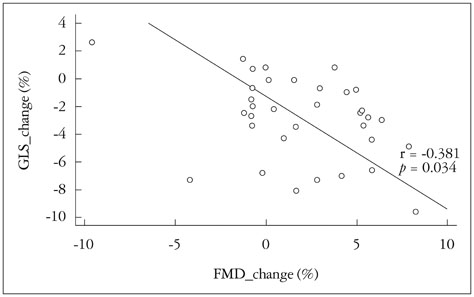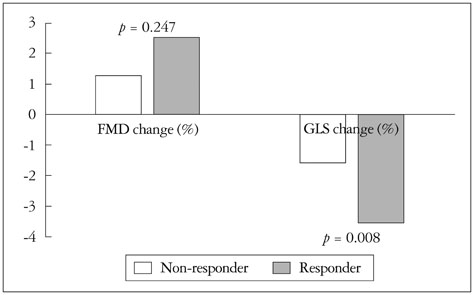J Cardiovasc Ultrasound.
2017 Dec;25(4):118-123. 10.4250/jcu.2017.25.4.118.
Impact of Mindfulness Based Stress Reduction Therapy on Myocardial Function and Endothelial Dysfunction in Female Patients with Microvascular Angina
- Affiliations
-
- 1Division of Cardiology, Department of Internal Medicine, Kosin University College of Medicine, Busan, Korea. kyoungim74@gmail.com
- 2Convergence Medicine & Exercise Science Research Institute, Kosin University College of Medicine, Busan, Korea.
- KMID: 2399412
- DOI: http://doi.org/10.4250/jcu.2017.25.4.118
Abstract
- BACKGROUND
Mindfulness-based stress reduction (MBSR) is a structured group program that employs mindfulness meditation to alleviate suffering associated with physical, psychosomatic, and psychiatric disorders. In this study, we investigate the impact of MBSR on left ventricular (LV) and endothelial function in female patients with microvascular angina.
METHODS
A total of 34 female patients (mean age 52.2 ± 13.8 years) diagnosed with microvascular angina underwent a MBSR program with anti-anginal medication for 8 weeks. The global longitudinal strain (GLS) of the LV was used as a parameter to assess myocardial function and reactive brachial flow-mediated dilatation (FMD) was used to assess endothelial function. Symptoms were analyzed by the Symptom Checklist 90 Revised to determine emotional stress. Changes in GLS and FMD between baseline and post-MBSR were analyzed.
RESULTS
After 8 weeks of programmed MBSR treatment, stress parameters were significantly decreased. In addition, GLS (−19.5 ± 2.1% vs. −16.6 ± 2.5%, p < 0.001) and reactive FMD significantly improved (8.9 ± 3.0% vs. 6.9 ± 2.6%, p = 0.005) after MBSR compared to baseline. The changes in GLS correlated to changes in FMD (r = 0.120, p = 0.340) and with the changes in most stress parameters.
CONCLUSION
MBSR has beneficial impacts on myocardial and endothelial function in female patients with microvascular angina.
MeSH Terms
Figure
Reference
-
1. Pepine CJ. Ischemic heart disease in women: facts and wishful thinking. J Am Coll Cardiol. 2004; 43:1727–1730.2. Vaccarino V. Ischemic heart disease in women: many questions, few facts. Circ Cardiovasc Qual Outcomes. 2010; 3:111–115.3. Grippo AJ, Johnson AK. Stress, depression and cardiovascular dysregulation: a review of neurobiological mechanisms and the integration of research from preclinical disease models. Stress. 2009; 12:1–21.4. Hamilton S, Fagot BI. Chronic stress and coping styles: a comparison of male and female undergraduates. J Pers Soc Psychol. 1988; 55:819–823.5. McDaniel DM, Richards CS. Coping with dysphoria: gender differences in college students. J Clin Psychol. 1990; 46:896–899.6. Matthews KA, Owens JF, Kuller LH, Sutton-Tyrrell K, Lassila HC, Wolfson SK. Stress-induced pulse pressure change predicts women's carotid atherosclerosis. Stroke. 1998; 29:1525–1530.7. Ghiadoni L, Donald AE, Cropley M, Mullen MJ, Oakley G, Taylor M, O'Connor G, Betteridge J, Klein N, Steptoe A, Deanfield JE. Mental stress induces transient endothelial dysfunction in humans. Circulation. 2000; 102:2473–2478.8. Strawn WB, Bondjers G, Kaplan JR, Manuck SB, Schwenke DC, Hansson GK, Shively CA, Clarkson TB. Endothelial dysfunction in response to psychosocial stress in monkeys. Circ Res. 1991; 68:1270–1279.9. Lawrence RC, Helmick CG, Arnett FC, Deyo RA, Felson DT, Giannini EH, Heyse SP, Hirsch R, Hochberg MC, Hunder GG, Liang MH, Pillemer SR, Steen VD, Wolfe F. Estimates of the prevalence of arthritis and selected musculoskeletal disorders in the United States. Arthritis Rheum. 1998; 41:778–799.10. International Brachial Artery Reactivity Task Force. Corretti MC, Anderson TJ, Benjamin EJ, Celermajer D, Charbonneau F, Creager MA, Deanfield J, Drexler H, Gerhard-Herman M, Herrington D, Vallance P, Vita J, Vogel R. Guidelines for the ultrasound assessment of endothelial-dependent flow-mediated vasodilation of the brachial artery: a report of the International Brachial Artery Reactivity Task Force. J Am Coll Cardiol. 2002; 39:257–265.11. Rozanski A, Blumenthal JA, Davidson KW, Saab PG, Kubzansky L. The epidemiology, pathophysiology, and management of psychosocial risk factors in cardiac practice: the emerging field of behavioral cardiology. J Am Coll Cardiol. 2005; 45:637–651.12. Tofler GH, Muller JE. Triggering of acute cardiovascular disease and potential preventive strategies. Circulation. 2006; 114:1863–1872.13. Kim HS, Cho KI. Impact of chronic emotional stress on myocardial function in postmenopausal women and its relationship with endothelial dysfunction. Korean Circ J. 2013; 43:295–302.14. Cho KI, Shim WJ, Park SM, Kim MA, Kim HL, Son JW, Hong KS. Association of depression with coronary artery disease and QTc interval prolongation in women with chest pain: data from the KoRean wOmen'S chest pain rEgistry (KoROSE) study. Physiol Behav. 2015; 143:45–50.15. Kabat-Zinn J. An outpatient program in behavioral medicine for chronic pain patients based on the practice of mindfulness meditation: theoretical considerations and preliminary results. Gen Hosp Psychiatry. 1982; 4:33–47.16. Kabat-Zinn J, Lipworth L, Burney R. The clinical use of mindfulness meditation for the self-regulation of chronic pain. J Behav Med. 1985; 8:163–190.17. Kabat-Zinn J, Massion AO, Kristeller J, Peterson LG, Fletcher KE, Pbert L, Lenderking WR, Santorelli SF. Effectiveness of a meditation-based stress reduction program in the treatment of anxiety disorders. Am J Psychiatry. 1992; 149:936–943.18. Kabat-Zinn J. Bringing mindfulness to medicine: an interview with Jon Kabat-Zinn, PhD. Interview by Karolyn Gazella. Adv Mind Body Med. 2005; 21:22–27.19. Grossman P, Niemann L, Schmidt S, Walach H. Mindfulness-based stress reduction and health benefits. A meta-analysis. J Psychosom Res. 2004; 57:35–43.20. Carlson LE, Speca M, Faris P, Patel KD. One year pre-post intervention follow-up of psychological, immune, endocrine and blood pressure outcomes of mindfulness-based stress reduction (MBSR) in breast and prostate cancer outpatients. Brain Behav Immun. 2007; 21:1038–1049.21. Nyklíček I, Mommersteeg PM, Van Beugen S, Ramakers C, Van Boxtel GJ. Mindfulness-based stress reduction and physiological activity during acute stress: a randomized controlled trial. Health Psychol. 2013; 32:1110–1113.22. Parswani MJ, Sharma MP, Iyengar S. Mindfulness-based stress reduction program in coronary heart disease: A randomized control trial. Int J Yoga. 2013; 6:111–117.23. Amutio A, Martínez-Taboada C, Hermosilla D, Delgado LC. Enhancing relaxation states and positive emotions in physicians through a mindfulness training program: a one-year study. Psychol Health Med. 2015; 20:720–731.24. Nijjar PS, Puppala VK, Dickinson O, Duval S, Duprez D, Kreitzer MJ, Benditt DG. Modulation of the autonomic nervous system assessed through heart rate variability by a mindfulness based stress reduction program. Int J Cardiol. 2014; 177:557–559.25. Tacón AM, McComb J, Caldera Y, Randolph P. Mindfulness meditation, anxiety reduction, and heart disease: a pilot study. Fam Community Health. 2003; 26:25–33.26. Cho KI, Lee JH, Kim SM, Lee HG, Kim TI. Assessment of endothelial function in patients with fibromyalgia--cardiac ultrasound study. Clin Rheumatol. 2011; 30:647–654.27. Lee JH, Cho KI, Kim SM, Lee HG, Kim TI. Arterial stiffness in female patients with fibromyalgia and its relationship to chronic emotional and physical stress. Korean Circ J. 2011; 41:596–602.28. Ditto B, Eclache M, Goldman N. Short-term autonomic and cardiovascular effects of mindfulness body scan meditation. Ann Behav Med. 2006; 32:227–234.29. Robert McComb JJ, Tacon A, Randolph P, Caldera Y. A pilot study to examine the effects of a mindfulness-based stress-reduction and relaxation program on levels of stress hormones, physical functioning, and submaximal exercise responses. J Altern Complement Med. 2004; 10:819–827.30. Compare A, Zarbo C, Shonin E, Van Gordon W, Marconi C. Emotional regulation and depression: a potential mediator between heart and mind. Cardiovasc Psychiatry Neurol. 2014; 2014:324374.31. Béliveau R. [Mindfulness based stress reduction in a cardiac medical setting: my personal (22 years) and professional (10 years) experience]. Sante Ment Que. 2013; 38:297–313.
- Full Text Links
- Actions
-
Cited
- CITED
-
- Close
- Share
- Similar articles
-
- Diabetes Self-Care and Mindfulness Meditation
- Mindfulness-Based Interventions for Posttraumatic Stress Disorder
- Mindfulness-Based Therapy for Insomnia
- Effects of Mindfulness-Based Therapy on Depressive Disorder
- Pushing Boundaries: Cardiac Computed Tomography Reveals Myocardial Microvascular Dysfunction in Patients With Diabetes



